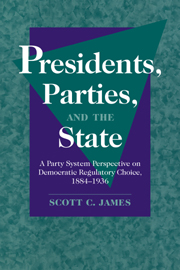 Presidents, Parties, and the State
Presidents, Parties, and the State Book contents
- Frontmatter
- Contents
- Acknowledgments
- 1 Introduction: Parties, Presidential Elections, and Regulatory Choice – A Party System Perspective
- 2 Swing States, Business Mugwumps, and the Interstate Commerce Act of 1887
- 3 The Progressive Party Vote and the Federal Trade Commission Act of 1914
- 4 Progressive Republicans and the “Death Sentence” for Public Utility Holding Companies During America's Second New Deal
- 5 Conclusion: Parties and the American Regulatory State
- Bibliography
- Index
1 - Introduction: Parties, Presidential Elections, and Regulatory Choice – A Party System Perspective
Published online by Cambridge University Press: 06 January 2010
- Frontmatter
- Contents
- Acknowledgments
- 1 Introduction: Parties, Presidential Elections, and Regulatory Choice – A Party System Perspective
- 2 Swing States, Business Mugwumps, and the Interstate Commerce Act of 1887
- 3 The Progressive Party Vote and the Federal Trade Commission Act of 1914
- 4 Progressive Republicans and the “Death Sentence” for Public Utility Holding Companies During America's Second New Deal
- 5 Conclusion: Parties and the American Regulatory State
- Bibliography
- Index
Summary
[American political history affords] striking illustration [s] of the strategic position that may be won by minor parties and of their potential influence on the programs of the major parties… Not every minor party can club a major party into acceptance of its policies. To do so the third-party must have its strength concentrated in close states, and the nation-wide contest as a whole must be regarded by party leaders as close. Otherwise, the splinter group carries no threat to the fortunes of either major candidate.
V.O. KeyFor many Americans of the late nineteenth century and early twentieth century, social anxiety and economic vulnerability were the most tangible fruits of industrial-capitalist modernization. “We are unsettled to the very roots of our being,” wrote Walter Lippman in 1914, crystallizing this turmoil and so much more. Several transformations seemed to be taking place at once. The penetration of competitive markets into once remote “island communities” strained social bonds and overturned established ways of life; while laissez-faire, with its cycles of boom and bust, aggravated economic uncertainty and militated against efforts at rational planning. As well, the passage of American capitalism from “proprietary-competitive” to “corporate-administered” stages brought forth indictments against the monopolistic practices of economic Goliaths; while, on a different foot, new forms of social organization and the spread of science and technology reordered basic human relationships.
Such crises occasioned searching critiques of the American political economy. Alternative visions of America's programmatic future, rooted in differences of interest and ideology, were devised and fiercely contested. Populism, progressivism, and socialism challenged the hegemony of nineteenth-century liberalism.
- Type
- Chapter
- Information
- Presidents, Parties, and the StateA Party System Perspective on Democratic Regulatory Choice, 1884–1936, pp. 1 - 35Publisher: Cambridge University PressPrint publication year: 2000
